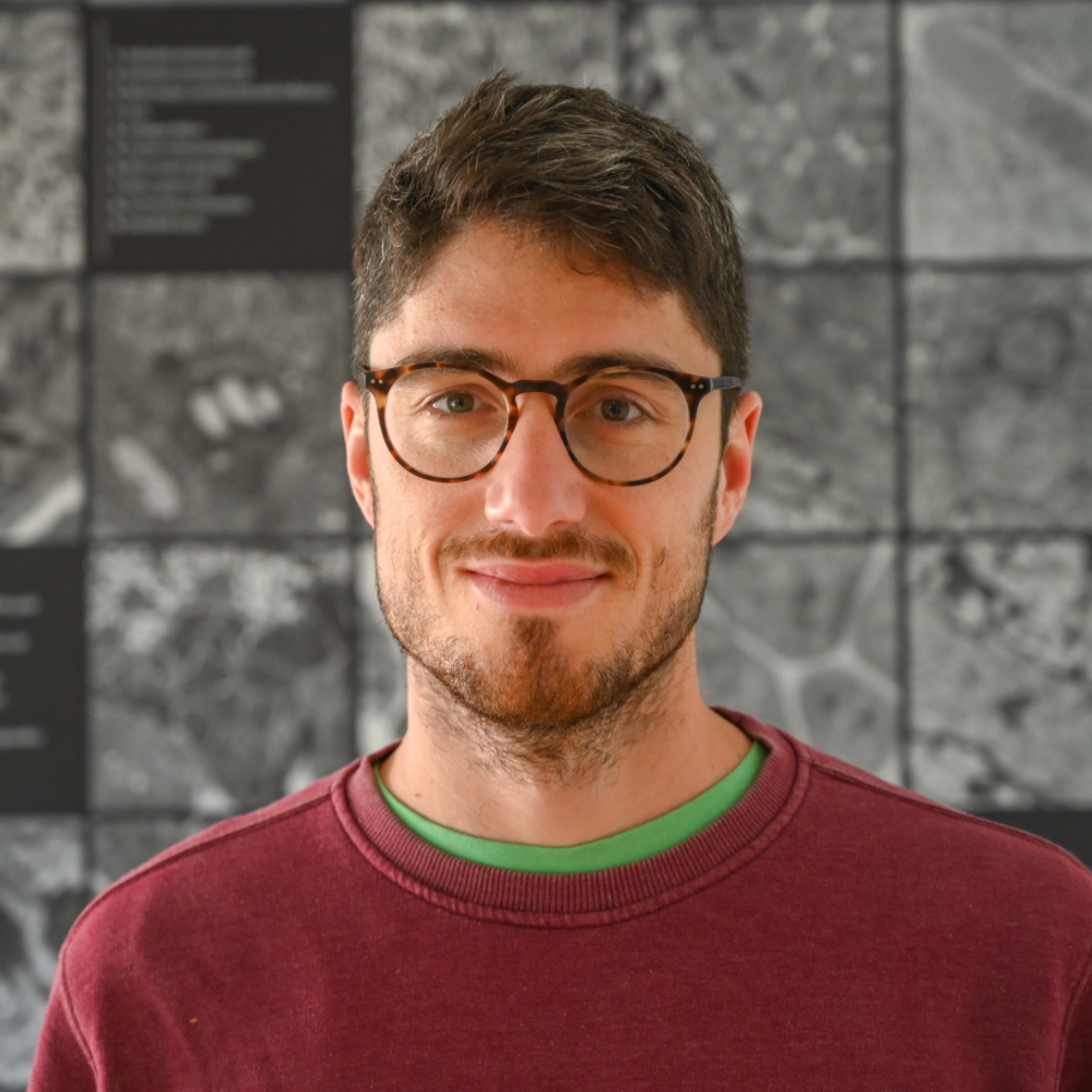Organisers
We are a group of PhDs and Postdocs from distinct backgrounds and research fields, including experimentalists and theorists alike. Brought together by a shared interest in the bidirectional feedback across scales in biology, we belong to varied research groups at the Instituto Gulbenkian de Ciência: the PONTE program, Living Physics, Patterning and Morphogenesis, Evolutionary Biology, Population and Conservation Genetics, and Integrative Behavioral Ecology groups. We have research experience working in institutions in France, Germany, Greece, Hong Kong, India, Italy, Spain, Switzerland and Portugal. Our wide range of backgrounds, research experiences and origins gives us a broad overview of research in biology. We are very proud to have put together a symposium gathering a group of excellent scientists who will bring exciting interdisciplinary research to the IGC community.
Contact us at bioscales2024@igc.gulbenkian.pt
 |
 |
 |
 |
| Adolfo Alsina | Artemis Korovesi | Camille Ameline | Lorenzo Fant |
| Evolutionary Biology | |||
 |
 |
 |
|
| Marta Liber | Ravi Vishwakarma | Yatharth Bhasin | |
| Integrative Behavioural Biology | Population and Conservation Genetics | Living Physics |
Adolfo Alsina
Adolfo is a theoretical physicist working at the interface between physics and biology. A physicist and mathematician by training, he obtained his PhD in Physics from the Max Planck Institute for the Physics of Complex Systems in Dresden, Germany. During his PhD, he studied the emergence of collective phenomena from feedback between microscopic and macroscopic processes in biological and artificial systems. Since March 2022 he is a PONTE postdoctoral fellow at the IGC, where he is developing a multiscale theoretical framework of the budding yeast cell cycle using a combination of methods from theoretical physics and data science. aalsina@igc.gulbenkian.pt
Artemis Korovesi
Artemis is a biologist and PhD student at the Gulbenkian Institute of Science (IGC). She completed her Bachelor's and Master's degrees in Biology at the University of Athens (UoA). Her studies focused on genetics / phylogenetics, and genomics. Then, she gained research and working experience in Dr. Capetanaki's lab and the Greek Genome Center at the Biomedical Research Foundation of the Academy of Athens (BRFAA), where she worked on the genetic diagnosis for cardiovascular diseases using next-generation sequencing and she investigated mammalian heart regeneration mechanisms. Her passion for science has driven her to pursue a PhD at IGC, where she is dedicated to studying cellular plasticity mechanisms in mouse embryo development under the supervision of Dr. Moises Mallo. akorovesi@igc.gulbenkian.pt
Camille Ameline
Camille is a generalist evolutionary biologist, with experience in various ecology and evolution research topics and models. She did her Master’s in Ecology and Evolution at the University of Rennes, where she studied reproductive trade-offs in birds and spiders. During her PhD at the University of Basel, on host-parasite coevolution, she investigated the evolutionary dynamics and genetic architecture of resistance to bacteria in a natural population of crustacean. She started her Postdoc at IGC in February 2022, where she is working on the evolution of gut microbiota in disease mice models. cameline@igc.gulbenkian.pt
Lorenzo Fant
Lorenzo is a physicist studying theoretical ecology and evolution. His main research interest is the modelling of fundamental community processes, following both theory and data driven approaches. He began his journey in research with a PhD at SISSA, Trieste and continued with a Postdoc at Granada University, before landing at Gulbenkian institute as a PONTE fellow. During his career he considered eco-evolutionary phenomena, where the timescales of ecology and evolution are similar enough for these processes to mutually affect each other, focusing on two aspects of ecology and evolution: the characterization of the stable state of ecological communities at evolutionary equilibrium and, on the other hand, the effects of stochasticity on the evolution of individual traits. lfant@igc.gulbenkian.pt
Marta Liber
Marta is a 2nd year PhD student at the Gulbenkian Institute of Science. During her Bachelor she investigated the Gut-Brain Axis in the lab of Dr. John Cryan, Ireland, where she decided to move to a more dimensional study of bioinformatics. Marta obtained a Master degree in Biomedical Science where she did a computational search for oscillatory gene expression during early vertebrate behavior, at the University of Algarve, Portugal. Additionally she studied the roots of lentil phylogeny and domestication in the field of Archeology and currently is starting an exciting project on Neurogenomics of social behavior in the lab of Dr. Rui Oliveira (IGC). mliber@igc.gulbenkian.pt
Ravi Vishwakarma
Ravi is a PhD student at the Gulbenkian Institute of Science (IGC). He obtained his integrated BS-MS degree in Physical Sciences from IISER Kolkata, India, where his master's was focused on computational biophysics. In the past, he also ventured into topics such as evolution and networks. Currently, he is a part of IGC’s Population and Conservation Genetics Group, where he investigates the Genetic consequences of habitat expansions and contractions under the supervision of Dr. Lounes Chikhi. rvishwakarma@igc.gulbenkian.pt
Yatharth Bhasin
Yatharth is a 1st year PhD student and is a physicist by training. Yatharth has been working at the interface of physics and biology. In the past he has worked on protein self-assembly and aggregation using computational models and optical experiments to study Amyloid-Beta aggregation. He is now a part of the Living Physics Group at IGC, where he is investigating the phototactic phenotypic response of micro algae at single cell and population scale, with a hope to bridge some gap between the two scales using experiments and theoretical models. byatharth@igc.gulbenkian.pt
